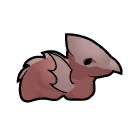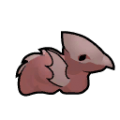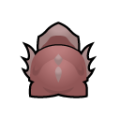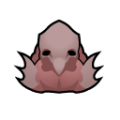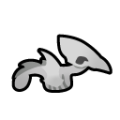Clawer dryad
| This article relates to content added by Ideology (DLC). Please note that it will not be present without the DLC enabled. |
Clawer dryad
A dryad caste with huge claws that is specialized in aggression and damage-dealing attacks. Though it can do tremendous damage, it is vulnerable to attacks itself.
In general, dryads are mammal-like creatures that have a symbiotic relationship with the Gauranlen tree. They reproduce together with their tree, which contains a hidden dryad queen. Dryads can morph into various specialized castes.
Base Stats
Pawn Stats
- Move Speed
- 4 c/s
- Health Scale
- 70% HP
- Body Size
- 0.667
- Mass - Baby
- 8.004 kg
- Mass - Juvenile
- 20.01 kg
- Mass - Adult
- 40.02 kg
- Carrying Capacity
- 50
- Filth Rate
- 1
- Diet
- none
- Life Expectancy
- 80 years
- Coastal Animal
- false
- Manhunter Chance
- 100%
- Manhunter Chance (Taming)
- 0%
- Trainable Intelligence
- Intermediate
- Available Training
- Guard, Attack
- Wildness
- 0%
- Toxic Resistance
- 100%
- Toxic Environment Resistance
- 0%
- Comfortable Temp Range
- -50 °C – 50 °C (-58 °F – 122 °F)
Production
- Meat Yield
 4 immature dryad meat
4 immature dryad meat
Melee Combat
- Attack 1
- Front left paw
18 dmg (Scratch)
80% AP
1.5 second cooldown
Stun for 320 ticks (5.33 secs) on first strike - Attack 2
- Front right paw
18 dmg (Scratch)
80% AP
1.5 second cooldown
Stun for 320 ticks (5.33 secs) on first strike - Attack 3
- Teeth
9 dmg (Bite)
13 % AP
2 second cooldown
0.3 chance factor
Stun for 280 ticks (4.67 secs) on first strike - Attack 4
- Head
4 dmg (Blunt)
6 % AP
2 second cooldown
0.1 chance factor - Average DPS
- 7.44
- tradeTags
- AnimalDryad
Clawer dryads are a caste of Dryads, a type of animal added by the Ideology DLC. Vulnerable but fearsome, the clawer dryad specializes in damage dealing.
Summary[edit]
All dryads, including the clawer dryad, are produced by a gauranlen tree. They have no need to eat, are immune to disease events, and have 100% Toxic Resistance, rendering them immune to Toxic fallout and Toxic buildup. Dryads cannot die from blood loss, so in practice will survive virtually any damage that doesn't immediately kill them. Dryads can retreat to a healing pod in order to regenerate wounds; this takes 3 days and heals all permanent injuries and bad conditions.
Attacks[edit]
Thanks to the Melee Verb system, clawer dryads will only ever use their two best attacks, their front claws, unless they're missing body parts. This attack stuns for 5.33 seconds on first hit and has strong damage, with 80% armor penetration on a fast attack interval. If both claws are somehow destroyed, then they will resort to biting and headbutting.
| Melee Attacks | Damage Amount | Cooldown | Chance |
|---|---|---|---|
| Cut | 18 | 1.5 sec | 100% |
| Bite | 9 | 2.0 sec | 0% |
| Blunt | 4 | 2.0 sec | 0% |
In terms of overall DPS, clawer dryads are some of the strongest melee combatants in the game. They outstrip both the scyther and thrumbo, though the latter two can hit harder with individual attacks.
Analysis[edit]
Clawer dryads are glass cannons, make no mistake. Having about 28% the health of a Grizzly bear, individual clawer dryads are weak combatants. However, with a dedicated tank or swarm of other clawer dryads, they'll put up an impressive (and quick) fight. A pack of four can take down a Thrumbo on their own and only receive a handful of hits in the process. Their excellent DPS and armor penetration helps against any foe.
As far as combat animals go, clawer dryads excel not only because of their combat capabilities, but also because they are arguably the most disposable pawn in the game. A leg shot off normally means a forever crippled warg, and a crushed jaw results in your bear no longer able to haul. Animals also take effort to train. All this is before considering that colonists can bond with them. While animals will bleed out, downed dryads can safely sit on the floor without risking death, and hop in a pod for 3 days to come out good as new. Even if killed, it will be replaced naturally by the tree after 13 days; 8 for the tree to grow, and 5 for the dryad to grow up.
With the ability to take Go-juice or even Luciferium in a pinch and shrug off any unlucky side effects with a healing pod, clawer dryads push their endurance to their limit, making them devastatingly effective forays into melee range. They have two main costs. A connected pawn gets a small -2 mood debuff per dryad death, but if the connected pawn tends to the dryad, then they can bond. The bigger drawback is that maintaining a gauranlen tree takes a significant amount of time to prune (using Plants skill) - possibly more than training animals. Overall, if you expect frequent combat and can play to their strengths, clawer dryads can be extremely competitive combatants.
Training[edit]
This animal can be trained as follows:
| | |
| | |
| | |
| |
*As of version 1.1.2610, all animals can be tamed. The percentage of likelihood of success depends on factors such as the Animals Wildness Percentage, Pawn Handling Skill, and others. More information can be found on the animals page.
Clawer dryads spawn fully trained in Guard and Attack and have no training decay.
Health[edit]
The body part table is collapsed due to length. Expand to view.
| Part Name | Health | Quantity | Coverage[1] | Target Chance[2] | Subpart of | Internal | Capacity[3] | Effect if Destroyed/Removed |
|---|---|---|---|---|---|---|---|---|
| Body | 28 | 1 | 100% | 21% | N/A[4] | - | Death | |
| Tail | 7 | 1 | 7% | 7% | Body | - | - | |
| Spine | 17.5 | 1 | 3% | 3% | Body | Moving |
−100% Moving[5] | |
| Stomach | 14 | 1 | 3% | 3% | Body | Digestion |
−50% Digestion | |
| Heart | 10.5 | 1 | 3% | 3% | Body | Blood Pumping |
Death | |
| Lung | 10.5 | 2 | 3% | 3% | Body | Breathing |
−50% Breathing. Death if both lost. | |
| Kidney | 10.5 | 2 | 3% | 3% | Body | Blood Filtration | −50% Blood Filtration. Death if both lost. | |
| Liver | 14 | 1 | 3% | 3% | Body | Digestion |
Death | |
| Neck | 17.5 | 1 | 20% | 5% | Body | Eating Talking Breathing |
Death | |
| Head | 17.5 | 1 | 75% | 2.25% | Neck | - | Death | |
| Skull | 17.5 | 1 | 25% | 1.125% | Head | - | Cannot be destroyed Increasing Pain based on damage. | |
| Brain | 7 | 1 | 70% | 2.625% | Skull | Consciousness |
Death Damage always results in scarring. | |
| Eye | 7 | 2 | 12% | 1.8% | Head | Sight |
−25% Sight. −100% if both lost. Damage always results in scarring. 0% Hit Chance against Blunt damage. | |
| Ear | 8.4 | 2 | 8% | 1.2% | Head | Hearing |
−25% Hearing. −100% if both lost. | |
| Nose | 7 | 1 | 10% | 1.5% | Head | - | - | |
| AnimalJaw | 7 | 1 | 10% | 1.5% | Head | Manipulation |
−100% Manipulation. Can no longer use Bite attack. | |
| Front Leg | 21 | 2 | 7% | 5.95% | Body | Moving |
−25% Moving. −50% if both lost. Can no longer use paw attack.[6] | |
| Front Paw | 7 | 2 | 15% | 1.05% | Front Leg | Moving |
−25% Moving. −50% if both lost. Can no longer use paw attack. | |
| Rear Leg | 21 | 2 | 7% | 5.95% | Body | Moving |
−25% Moving. −50% if both lost. | |
| Rear Paw | 7 | 2 | 15% | 1.05% | Rear Leg | Moving |
−25% Moving. −50% if both lost. |
- ↑ Coverage determines the chance to hit this body part. It refers to the percentage of the super-part that this part covers, before its own sub-parts claim their own percentage. For example, if the base coverage of the super-part is 100%, and the coverage of the part is 20%, 20% of hits would hit the part, and 80% the super-part. If the part had its own sub-part with 50% coverage, the chances would be 10% sub-part, 10% part, 80% super part.
- ↑ Target Chance is the actual chance for each part to be be selected as the target when each part's coverage has been taken into account(I.E. Neck covers 7.5% of Torso but Head covers 80% of Neck so it actually has only a 1.5% chance to be selected). This is not pure hit chance, as different damage types propagate damage in different ways. See that page for details.
- ↑ Note that capacities can affect other capacities in turn. Only the primary effect is listed. See specific pages for details.
- ↑ This is the part that everything else connects to to be considered 'connected'.
- ↑ If Moving drops below 16% a pawn cannot move.
- ↑ A Scratch attack that varies from animal to animal. Each front paw allows one attack.
Attack table
| Attack (Damage type) |
DPS[1] (Post Hit Chance)[2] |
Dam. | Cool. | AP | Selection chance[3] | |
|---|---|---|---|---|---|---|
| Average | 12 (7.44) |
- | - | 80% | - | |
| Front left paw (Scratch) |
12 (7.44) |
18 | 1.5s | 80% | 50% | |
| Front right paw (Scratch) |
12 (7.44) |
18 | 1.5s | 80% | 50% | |
| Teeth (Bite) |
4.5 (2.79) |
9 | 2s | 13% | 0% | |
| Head (Blunt) |
2 (1.24) |
4 | 2s | 6% | 0% | |
- ↑ Note: This is the actual base average derived from the melee verb system updated in 1.1.2610, it may sometimes disagree with the listed value in the in-game infobox.
It may also change depending on the stats and the melee verbs available to the pawn. - ↑ Assuming a melee hit chance of 62%
- ↑ Chance for attack to be selected. It may change depending on the melee verbs available to the pawn.
Gallery[edit]
Version history[edit]
- Ideology DLC Release - Added.
- 1.3.3076 - Fix: Dryads are affected by disease incidents.
- 1.3.3101 - Change: Dryad Healing Pods now remove all negative hediffs in addition to restoring lost body parts.
